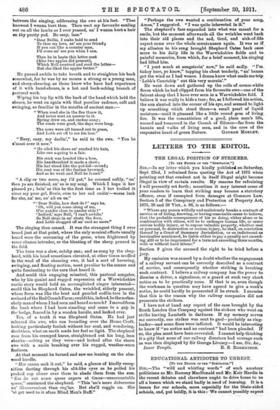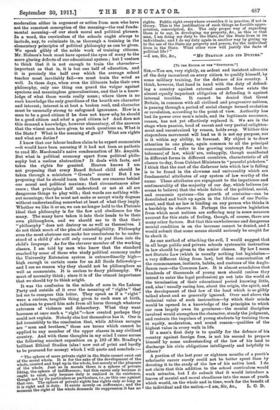EDUCATIONAL ANTIDOTES TO UNREST. [To THE EDITOR OPT= "spncrAroa."1
Sin,—The "wild and whirling words" of such amateur politicians as Mr. Ramsay MacDonald and Mr. Keir Hardie in the recent debates and elsewhere ought to drive home to us all a lesson which we stand badly in need of learning. It is a lesson for our schools, more especially for the State-aided achOols, and, put boldly, it is this : We cannot possibly expect moderation either in argument or action from men who have
not the remotest conception of the meaning—the real funda- mental meaning—of our stock moral and political phrases. In a word, the curriculum of the schools ought always to include, nay, to culminate in, as thorough a training in the elementary principles of political philosophy as can be given.
We speak glibly of the noble work of training citizens. Mr. Holmes's book must have opened the eyes of many to the more glaring defects of our educational system ; but I venture to think that it is not enough to train the character—
important as that is, it is but one half of education, and it is precisely the half over which the average school teacher must inevitably fail—we must train the mind as well. In these days, when even the illiterate bake their own philosophy, only one thing can guard the vulgar against specious and meaningless generalizations, and that is a know- ledge of what these words really mean ; where there is no such knowledge the only guardians of the hearth are character and interest; interest is at best a broken reed, and character
must be unusually strong to safeguard ignorance. How is a man to be a good citizen if he does not know why he should be a good citizen and what a good citizen is ? And does not this demand a knowledge, however elementary, of the answers that the wisest men have given to such questions as, What is
the State P What is the meaning of good ? What are rights and what are duties ?
I know that our labour leaders claim to be expert economists —it would have been amusing if it had not been so pathetic to read Mr. Macdonald's naive condemnation of Mr. Asquith.
But what is political economy apart from political philo- sophy but a useless abstraction ? It deals with facts, and takes the rights for granted. Heaven knows I am not proposing that every Board School child should be taken through a miniature " Greats" course ! But I am
proposing that he should learn that there are reasons behind our moral and political maxims; that circumstances alter cases ; that principles half understood or not at all are dangerous things to play with ; that words are nothing with- out meanings; that he must not make or accept windy dogmas without understanding somewhat at least of what they imply.
Whether we like it or no, we can no longer hold to the Platonic ideal that philosophy is for the few and obedience for the many. The many have taken it into their heads to be their own philosophers, and we should see to it that their "philosophy " does not destroy us as well as themselves. I do not think much of the plea of unintelligibility. Philosophy even the most abstruse can make her conclusions to be under- stood of a child if she will only consent to put them into the child's language. As for the cleverer member of the working classes, I am told by men who know that the standard reached by some of these who study political economy under the University Extension system is extraordinarily high—
high enough in certain cases for an All Souls fellowship— and I see no reason why they should not be philosophers as well as economists. It is useless to decry philosophy. We must of necessity think ; since it is of the utmost importance that we should try to think aright.
It was the confusion in the minds of men in the Labour Party and outside of it over the meaning of " rights " that led me to compose this letter. They speak as if a " right " were a curious, tangible thing given to each man at birth,
a talisman to guard him safe from all harm through whatever extremes of violence and debauchery. What they want becomes at once such a "right "—how created perhaps they
could not explain. Nobody else but themselves has it. One is led irresistibly to the conclusion that, while African savages are " men and brothers," these are terms which cannot be applied to any member of the upper classes in any civilized country. And with these thoughts in my mind I came across the following succinct exposition on p. 192 of Mr. Bradley's brilliant Ethical Studies (alas now out of print and hardly to be procured for money) which I will quote and conclude :-
" The sphere of mere private right in the State cannot exist out of the moral whole. It is for the sake of the development of the whole, created and kept up in the whole, but merely at the pleasure of the whole. Just so in morals there is a sphere of private liking, the sphere of indifference ; but this exists only because it ought to exist, only because duty is realized in its existence, though not by its particulars as particulars, i.e., as this one against that one. The sphere of private rights has rights only so long as it is right and is duty. It exists merely on sufferance ; and the moment the right of the whole demands its suppression it has no
rights. Public right everywhere overrides it in practice, if not in theory. This is the justification of such things as forcible appro- priation, conscription, &c. The only proper way of regarding them is to say, in developing my property, &c., as this or that man, I am doing my duty to the State, for the State lives in its individuals ; and I do my duty again in another way by giving up to the use of the State my property and person, for the individual lives in the State. What other view will justify the facts of political life ? "
—I am, Sir, &c., "MY STATION AND ITS DITTIES."











































 Previous page
Previous page